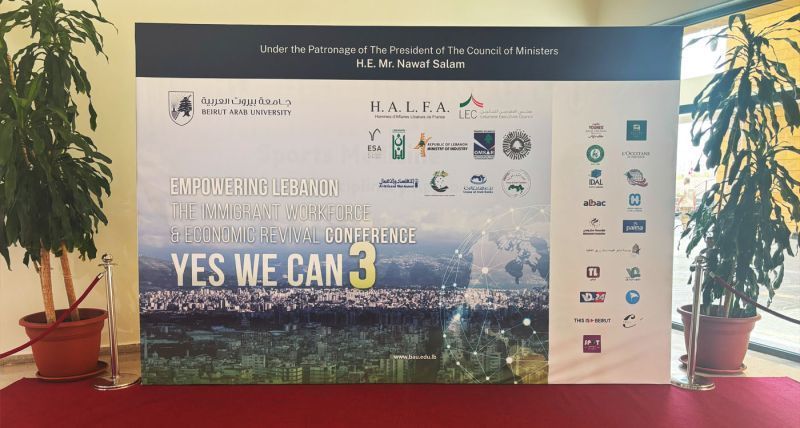
Ministers and diaspora leaders convened at the landmark conference to shape Lebanon’s economic revival.
Under the patronage of Prime Minister Nawaf Salam, the third edition of the “Tripoli, Yes We Can” conference took place at the Beirut Arab University Tripoli campus on Monday. Bringing together political decision-makers and Lebanese diaspora representatives, the event aimed to map out a bold vision for national economic recovery – extending well beyond local concerns.
Industry: A Crucial Sector Undermined by Underfunding
Industry Minister Joe Issa al-Khoury highlighted the sector’s vast but underutilized potential: over 240,000 direct jobs, $2.5 billion in annual exports, more than 1,500 exportable products and a contribution exceeding $10 billion to Lebanon’s GDP. Yet, between 2000 and 2019, the Ministry received just $83 million – merely 0.03% of the total budgets allocated by successive governments.
This chronic underfunding, he warned, starkly contrasts with the strategic role industry could play in stabilizing Lebanon’s real economy and correcting its trade imbalance. Issa al-Khoury called for a fundamental shift in priorities to revitalize the country’s productive sector in a nation that imports far more than it exports.
An Economy in Urgent Need of Transformation
Mohammad Abou Haydar, the Director General of the Ministry of Economy, delivered a sobering assessment. Lebanon’s economy, which once boasted a GDP between $55 billion and $65 billion, now struggles to recover even half that value.
“To restore confidence, there is one essential requirement: reforms. Confidence cannot return without them,” he stressed. The ongoing brain drain underscores this challenge – between 2019 and 2023, around 215,000 graduates left Lebanon. Paradoxically, the country registered 282 invention patents in the same period, showing that while Lebanon remains capable of innovation, it “unfortunately cannot retain its talent due to an unfavorable environment.”
This dilemma exemplifies Nobel laureate Gary Becker’s 1992 human capital theory: investments in education yield economic returns only when institutional frameworks allow skills to be effectively utilized and valued.
Tourism: A Crucial Growth Driver for Tripoli
Tourism Minister Laura Lahoud emphasized that “tourism is not an auxiliary sector.” Before the crisis, it supported over 300,000 direct and indirect jobs – about 25% of the active workforce – and contributed between 20% and 35% of Lebanon’s GDP.
She spotlighted Tripoli, the “cultural capital of the North,” long “unfairly marginalized.” Beyond traditional tourism, Lahoud advocated for promoting rural hospitality and authentic guesthouses that reflect the region’s rich heritage.
However, she acknowledged persistent challenges: inadequate infrastructure, lack of accurate data, limited banking finance and competition from unauthorized projects continue to hinder development.
Digital Transformation: Lebanon’s Path Forward, According to Fadi Makki
Minister of Administrative Reform Fadi Makki presented digital technology as a vital growth sector. “Lebanon has the human capital – Lebanese expertise is driving digital transformation initiatives across the Gulf, the Americas and Europe.”
Makki underscored the sector’s potential impact: “Our digital transformation strategy could contribute around 5% annually to Lebanon’s GDP. Digital investments can create high-growth employment opportunities that extend beyond the local market.”
Yet, significant obstacles remain: “The Internet and electricity supply are often unreliable.” He also stressed “the urgent need for legislation regulating investments, including laws on electronic signatures and data privacy.”
The Strategic Role of the Diaspora
Maxence Duault, the Director General of the École Supérieure des Affaires (Graduate School of Business), revealed that diaspora remittances currently total between “$6 and $7 billion annually, with the potential to increase to $8 or $9 billion.” However, these funds largely serve as family support rather than broader economic investments.
“We aim to build a strategic partnership with the Lebanese diaspora,” Duault said, stressing that “business leaders in the diaspora will only make significant investments if guaranteed protection.” He identified three essential pillars for success: attracting capital, safeguarding it and wisely directing it.
To foster trust, Duault emphasized the importance of the rule of law and restoring the banking system’s credibility.
A Moving Testimony from Antoine Menassa
Antoine Menassa, the President of Lebanese Businessmen in France (LBF), known in French as HALFA, offered a heartfelt testament to the diaspora’s enduring bond: “We have traveled the world together – from Australia to South Africa to Canada.” He stressed, “They came because they believe in their homeland, the motherland, Lebanon.”
The diaspora’s commitment remains robust, “with $6.6 billion transferred to Lebanon” from abroad last year alone. Reflecting on Tripoli’s industrial past, Menassa recalled “the al-Arida factory, which once employed 5,000 people.”
The “Tripoli, Yes We Can” conference highlighted Lebanon’s deep structural economic challenges while outlining potential recovery paths centered on industry, digital innovation, tourism and the diaspora. Though Tripoli did not dominate the agenda, it symbolized a catalyst for a productive, open and reformed Lebanon. The challenge now is to turn this vision into tangible action, in a country where promises only hold weight when realized.




Comments